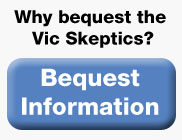By Mal Vickers
Before you read any further, try to guess the answer to this question:
In Australia, in 2012, how many chiropractic treatments occurred as a result of a doctor’s referral?
To clarify, I’m not asking for the total number of chiropractic consultations that occur per year, just patients consultations for chiropractic treatment where the patient was referred by a medical doctor – how many? Find the answer in the text below highlighted in red. How close were you?
Medicare Dollars are Taxpayer Dollars
Everyone in Australia pays for Medicare rebates through the tax system. Medicare enables community access to a variety of quality health services but that’s not in question. What I’d really like to look at is how much we pay through the Medicare system for treatments that show little or no efficacy. Read the rest of this entry »



 Posted by malvickers
Posted by malvickers 













